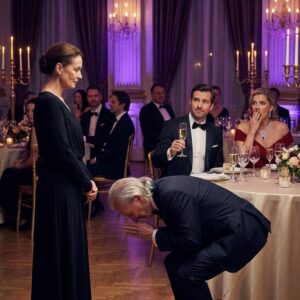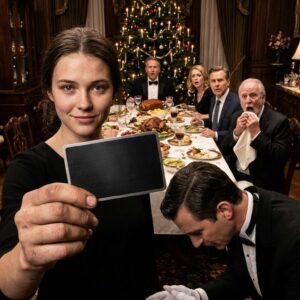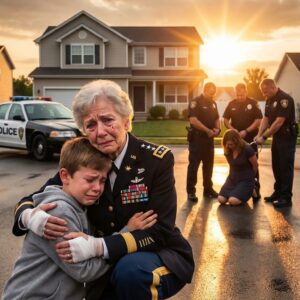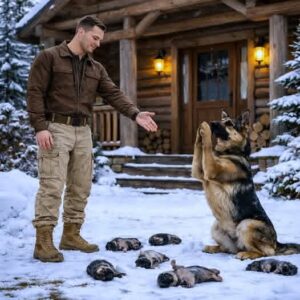The radio crackled with static, a harsh hiss that cut through the silence of the cruiser before clearing into the dispatcher’s monotone. There was a fender bender reported on Route 60 near the old truck stop. My hand hovered over the receiver, instinct pulling me toward the action, but another unit called it in first.
I retracted my hand, gripping the steering wheel at ten and two, and kept driving.
October in Kentucky is a season of beautiful dying. The world burns in shades of copper, rust, and bruised purple. The leaves hadn’t fallen yet; they clung to the branches like stubborn memories refusing to let go, even as the wind tried to shake them loose. I liked this time of year. The world looked honest when it was falling apart. It didn’t try to hide the decay behind green lies.
My name is Tobias Harwell, and I’ve been patrolling Interstate 64 for twelve years. For the last three hours, it had been a parade of the mundane: speeders, a broken taillight, one driver with an expired registration who cried when I wrote the ticket. She’d lost her job two weeks ago. I wrote the ticket anyway—the law is a blunt instrument—but I softened my voice, suggesting she contest it in court. Judges sometimes show mercy to those who just show up.
The highway stretched ahead, two lanes of cracked asphalt cutting through a patchwork of farmland and forest. Ashford was twenty miles behind me. The next town, Grayson, was fifteen miles ahead. Between them lay nothing but cows, cornfields stripped for harvest, and the occasional gas station that looked like it hadn’t been updated since 1987.
I glanced at the dashboard clock: 2:43 P.M.
My shift ended at six. I let my mind drift to dinner—leftover chicken, likely, or maybe a stop at the diner on Fifth Street where Monica, the waitress with the kind eyes, always gave me extra fries without asking. Small kindnesses. They were the glue holding the world together.
A silver sedan passed me in the opposite lane, heading east. Tennessee plates.
I noted it automatically, the way a cop notes everything. Make, model, color. Driver visible through the windshield: a male, thirties or forties, alone in the front seat. The car wasn’t speeding. It wasn’t swerving. Nothing about the vehicle triggered an alarm.
Except…
I frowned, my eyes narrowing as the sedan shrank in my rearview mirror.
Something was wrong. Not wrong in the way that makes you flip on the lights and chase down a suspect. Wrong in the way that makes the fine hair on the back of your neck stand up. It was the itch. The instinct. The thing you either learn to trust or learn to ignore at your own peril.
I slowed the cruiser, pulling onto the gravel shoulder, and watched the silver speck disappear around a curve in the road. My pulse ticked up, a rhythmic thud in my ears. What was it? What had I seen?
Then, the image crystallized in my mind. The back window.
There had been something taped to the inside of the rear passenger window. A piece of white paper, rectangular, fluttering slightly against the glass. At sixty miles an hour, I couldn’t have read it, but my brain had cataloged it anyway. It had filed it under Wrong, and now it was demanding my attention.
I made a U-turn, tires kicking up a spray of gravel and dust, and accelerated.
I caught sight of the sedan two minutes later. It was maintaining a steady sixty miles per hour, blending in perfectly with the sparse traffic. I dropped back, keeping three car lengths between us, and focused my eyes on that rear window.
There it was. A piece of standard printer paper, pressed against the glass and secured with strips of clear tape. As I drew closer, the details emerged from the blur. Crayon marks. Thick, uneven, waxy strokes.
My chest tightened, a cold vice clamping around my lungs.
The drawing showed a face. A round head, two dots for eyes, a mouth curved aggressively downward. Tears—blue streaks—running from the eyes to the bottom of the page. And below the face, in large, shaky letters that took up half the paper:
H E L P
The ‘H’ was backward. The ‘E’ looked more like a three. But the message was unmistakable. A child had drawn this. A child had taped it to the window, a desperate message in a bottle cast into the asphalt sea, praying someone on the outside would see it.
I reached for the radio, my voice dropping an octave. “Dispatch, this is Unit 12. I’m eastbound on I-64, mile marker 72, following a silver sedan, Tennessee plates.” I read off the license number. “Run the plates. Check for alerts. Now.”
“Copy that, Unit 12. Stand by.”
I kept my distance, watching the silhouette of the driver. His posture was rigid, the slope of his shoulders tense. He was awake, alert. Maybe too alert.
The radio crackled back. “Unit 12. No active warrants on the registered owner. Vehicle comes back to a Raymond Parker. White male, age thirty-eight. Address in Memphis. No priors. Want me to dig deeper?”
“Negative,” I said, my eyes never leaving that sad, crayon face. “I’m going to make contact. Just stay on the line.”
“Copy. Be safe, Toby.”
I activated the lights.
The spinning red and blue LEDs exploded against the autumn trees, casting manic shadows across the road. For a long, terrifying moment, the sedan didn’t react. It kept driving, indifferent to the authority behind it. I leaned forward, adrenaline flooding my system. Was he going to run?
Then, slowly, the brake lights flared ruby red. The car drifted toward the shoulder and came to a stop.
I pulled in behind it, angling my cruiser for cover. I took a deep breath, the kind that fills your diaphragm, steadying the tremor in my hands. I opened the door. The October air hit me—cool, sharp, smelling of distant rain and decaying earth.
I approached the driver’s side, one hand resting near my service weapon, eyes scanning the interior. The driver had both hands on the wheel, visible. That was good. But his chest was heaving. He was breathing like a man who had just run a marathon.
I stopped at the window and tapped on the glass.
The driver turned. Raymond Parker looked older than thirty-eight. His dark hair was uncombed, greasy. His eyes were red-rimmed, hollowed out by exhaustion or crying. Maybe both. He lowered the window halfway.
“Afternoon,” I said, keeping my tone flat, professional. “License and registration, please.”
He fumbled with the glove compartment, his hands shaking so badly he dropped the registration card twice. He finally handed it over, along with a worn leather wallet, refusing to make eye contact.
“Mr. Parker,” I said, looking from the ID to his face. “Where are you headed today?”
“Nashville,” Raymond rasped. His voice sounded like gravel grinding together. “Visiting family.”
“Family in Nashville?”
“My mother. She’s… she’s not doing well.”
I nodded, saying nothing. I let the silence hang there, heavy and suffocating, while I casually glanced toward the back seat.
That’s when I saw her.
A little girl, strapped into a booster seat on the passenger side. Four years old, maybe five. Dark curls framing a pale, porcelain face. She wore a pink jacket with a cartoon character I didn’t recognize. Her hands clutched a stuffed bear, its brown fur matted and worn gray with love.
She stared at me with wide, unblinking eyes. She didn’t smile. She didn’t wave. She sat frozen, like a statue. And right beside her head, taped to the glass, was the drawing.
I looked back at Raymond. “That your daughter?”
“Yes.” His jaw clenched, a muscle jumping in his cheek. “Nora. She’s coming with me to see her grandmother.”
“Nora,” I repeated, tasting the name. “And her mother? Where is she?”
Raymond’s knuckles turned white on the steering wheel. “The home. Louisville. She… she knows we’re going.”
Liar.
Everything about this screamed wrong. The drawing. The child’s catatonic silence. The sweat beading on Raymond’s forehead in fifty-degree weather.
“Mr. Parker,” I said, stepping back slightly. “I’m going to need you to step out of the vehicle.”
His head snapped toward me. “Why? I wasn’t speeding.”
“Step out of the vehicle, sir.”
“No. This is harassment. I know my rights!”
“Mr. Parker,” I said, dropping my hand to rest on the grip of my weapon. “I’m not asking. Step out of the vehicle. Now.”
For a second, I saw him calculate it. I saw his eyes dart to the rearview mirror, measuring the distance, wondering if he could punch the gas and run. I braced myself.
Then, the fight drained out of him. He opened the door and stepped out, his legs unsteady.
“Put your hands on the hood,” I ordered.
Raymond obeyed, his movements sluggish. I keyed my radio. “Dispatch, I need backup at my location. Possible Code Adam.”
Code Adam. Missing or endangered child. The words tasted like ash.
“Copy, Unit 12. Unit 9 is en route. ETA seven minutes.”
Seven minutes is a lifetime. I turned my attention to the man under my hands. “Mr. Parker, I’m going to ask you some questions. But first, I need the contact information for Nora’s mother.”
“Why?” Raymond’s voice cracked. “She’s not… this has nothing to do with her.”
“Name and number. Now.”
He sagged against the hood. “Clare. Clare Parker. The number is in my phone.”
I retrieved his phone, dialed the contact, and waited. It rang twice.
“Raymond?” A woman’s voice answered, tight with panic. “Where is she? Where is Nora?”
My stomach dropped through the floor. “Ma’am, this is Officer Tobias Harwell. Who am I speaking with?”
A sharp intake of breath. “Clare Parker. Is… is my daughter with you? Is she okay?”
“She’s here, ma’am. She’s safe. Can you tell me what’s happening?”
“He took her!” Clare sobbed. “He took her from school. There’s an Amber Alert out—didn’t you get it? There’s a restraining order!”
I looked at Raymond. He had closed his eyes, his forehead resting against the cold metal of the car hood.
“I need you to stay calm,” I told Clare. “Nora is safe. I’m going to make sure she stays that way.”
I walked back to the rear window. I crouched down, eye-level with the glass. Nora hadn’t moved. She was still clutching that bear as if it were the only thing anchoring her to the earth.
“Hey there, Nora,” I said through the glass. “I saw your picture.”
Her eyes flicked to the drawing, then back to me.
“It’s a very brave picture,” I said. “You did a good job.”
A single tear tracked down her cheek. She nodded, just once.
When Officer Grant arrived, we cuffed Raymond. He didn’t fight. He just stood there, staring at the ground, muttering something about love. Love. People always use that word to justify the wreckage they leave behind.
I took Nora out of the car myself. She was light, fragile as a bird. I carried her to my cruiser, wrapped her in a blanket, and sat with her while Grant processed the sedan.
“Officer Tobias?” she whispered, her voice tiny.
“Yeah, sweetheart?”
“Why was Daddy crying?”
I looked at her, and for a moment, I saw the ghost of my sister, Katie. Eleven years ago, Katie had called me, crying, saying she needed help. I had told her to lock the door and I’d be there in the morning. She was dead before sunrise. Her husband had driven them both off a bridge. The official report said “accident.” I knew it was murder-suicide.
I had failed Katie. I had missed the signs.
“I think your daddy made some big mistakes,” I told Nora gently. “And sometimes, grown-ups cry when they know they’ve done something they can’t fix.”
Grant walked over, holding an evidence bag. Inside was a spiral-bound notebook.
“You need to see this, Toby,” Grant said, his face grim. “Found it under the seat.”
I opened the bag. The notebook was filled with frantic handwriting. Maps. Lists. And on the last page, underlined three times:
If I can’t have her, neither should Clare.
The chill that went down my spine had nothing to do with the October wind.
The interrogation room was cold. Raymond Parker sat across from me, his hands cuffed to the table. He looked smaller now, stripped of his vehicle and his control.
“We found the map, Raymond,” I said, tossing the evidence bag on the table. “You weren’t going to Nashville. You were heading for the Canadian border.”
He didn’t look up. “I just wanted to be her father.”
“You kidnapped her.”
“The court took her away! They said I was unstable!” He slammed his fists on the table, the chain rattling violently. “I love her! That’s all I’ve ever done!”
“You loved the idea of possessing her,” I corrected him, my voice hard. “We read the notebook, Raymond. ‘If I can’t have her, neither should Clare.’ That’s not love. That’s a death threat.”
Raymond deflated. He put his head in his hands and wept. It was a pathetic sound.
Outside in the lobby, Clare Parker had arrived. She looked like she had driven through a hurricane. When she saw Nora sitting on the couch with the family liaison officer, she collapsed. It was the sound of a mother’s soul returning to her body—a guttural, heaving sob of relief.
I watched through the glass partition. I watched them hold each other. I watched Nora press her face into her mother’s neck, finally letting go of the bear to hold onto something real.
Later, as Clare was buckling Nora into her own car to take her home, she stopped.
“Officer Harwell,” she said. Her eyes were red, but clear. “That drawing. The one in the window.”
“Yes?”
“I’m glad you saw it. Most people… most people wouldn’t have looked twice.”
“I try to look,” I said. “Take care of her, Clare.”
“I will.” She hesitated. “Did he say anything? About why?”
“He said he loved her,” I said. “But you and I know better.”
She nodded grimly and drove away.
I went back inside the station. It was late. The adrenaline was fading, leaving behind a hollow exhaustion. I walked to my desk and opened the bottom drawer. Inside, buried under old case files, was a photo of my sister, Katie.
She was smiling in the picture, unaware that her time was running out. Unaware that her brother, the cop, would miss the signals until it was too late.
“I got one, Katie,” I whispered to the photo. “I didn’t miss this one.”
My phone buzzed. It was a text from Jenna, Katie’s best friend. We had reconnected recently. Two people bonded by the same grief.
Jenna: Thinking of you. Hope the shift wasn’t too heavy.
I typed back: It was heavy. But good. Really good.
I grabbed my jacket and walked out into the night air. The stars were out, sharp and bright above the Kentucky hills. For the first time in eleven years, the weight on my chest felt just a little bit lighter.
Six months later, spring arrived in Kentucky with a vengeance. The dogwoods exploded in white and pink, and the air smelled of wet earth and new life.
I was back on Route 60, patrolling the same stretch of asphalt. The world had turned. Raymond Parker had pleaded guilty to kidnapping and making terroristic threats. He was serving twelve years. He would never see Nora again.
My radio crackled. “Unit 12, got a disabled vehicle near mile marker 22. Out of gas.”
“Copy, en route.”
I pulled up behind a beat-up Honda. A young woman stood there, looking embarrassed. I helped her fill the tank from my emergency can. We made small talk about the weather, about the basketball game. It was a nothing call. A routine moment.
But as I drove away, I felt a sense of peace I hadn’t expected.
When I got back to the station, there was an email waiting for me. Subject line: Thank You.
It was from Clare.
Officer Harwell,
I know you’re busy, but I wanted to give you an update. We moved back to Louisville. Nora started kindergarten in January. She’s doing so much better. The nightmares have stopped.
She draws all the time now. But she doesn’t draw sad faces anymore. Yesterday, she drew a house with flowers and a big yellow sun. She told me it’s our ‘safe house.’
I kept the drawing from the car. I framed it. I keep it in my closet. Sometimes I look at it to remember how brave she was. And how lucky we were that you were the one on that road.
Thank you for paying attention.
—Clare
I read the email twice. A house with flowers. A big yellow sun.
I leaned back in my chair and closed my eyes. I could see it. I could see the crayon strokes, bright and messy and full of life. It was the opposite of the backwards ‘HELP’. It was a promise.
I thought about the notebook in Raymond’s car, full of darkness. And I thought about Nora’s new drawings, full of light. We choose what we keep. We choose what we frame.
I picked up my phone and called Jenna.
“Hey,” she answered on the first ring. “You okay?”
“Yeah,” I said, and for the first time, I meant it completely. “I’m okay. Want to get dinner?”
“I’d love that.”
I hung up and walked out to my cruiser. The sun was setting, painting the sky in violent streaks of orange and purple, but tomorrow it would rise again. The road stretched out before me, long and winding, full of people who needed help and people who just needed gas.
I put the car in drive. I checked my mirrors. I kept my eyes open.
That was the job. That was the life. You carry the ghosts so you can save the living. And sometimes, if you’re very lucky, you save yourself along the way.





